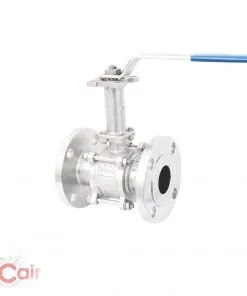Understanding the Importance of Ball Valves
In many different sectors, the flow of liquids and gases is controlled by a particular type of valve called a ball valve. They are a well-liked option for a variety of applications because of their reputation for toughness, dependability, and simplicity of use. A hole has been bored in the middle of the ball, which is normally made of metal like stainless steel or brass inside the valve. When the valve is closed, the ball rotates to obstruct the flow, and when it is open, the hole lines up with the flow of the liquid or gas.
Top Ball Valve Manufacturers in the MarketThere are several alternatives available when it comes to choosing the best ball valve manufacturer for your requirements. Some of the leading ball valve producers in the sector are:
Crane Fluid Systems: Known for their high-quality ball valves, Crane Fluid Systems offers a wide range of options made of stainless steel, brass, and plastic.
Cair: Cair is a leading manufacturer of industrial valves, including ball valves made of steel, stainless steel, and alloy. They are known for their durability and reliability.
Flowserve: Flowserve is a leading supplier of industrial valves, including ball valves made of stainless steel, alloy, and plastic. They are known for their quality and durability.
Kitz: Kitz is a leading manufacturer of ball valves, offering a wide range of options made of stainless steel, alloy, and plastic.
Choosing the Right Ball Valve Manufacturer for Your Needs
When choosing a ball valve manufacturer, there are several factors to consider. These include:
Quality: It is essential to choose a manufacturer that uses high-quality materials and has a reputation for producing durable and reliable valves.
Innovation: Look for a manufacturer that is constantly innovating and developing new and improved products.
Customer Service: Choose a manufacturer that offers excellent customer service and is willing to work with you to find the right solution for your needs.
Price: Price is also an important factor to consider when choosing a ball valve manufacturer. Look for a manufacturer that offers competitive pricing without compromising on quality.
Future Innovations in Ball Valve Manufacturing
The ball valve manufacturing industry is constantly evolving, and there are several trends that are expected to shape the industry in the future. These include:
Increased use of automation: Automation is expected to play a larger role in the ball valve manufacturing industry in the future, improving efficiency and reducing costs.
Development of new materials: New materials such as composites and plastics are being developed for use in ball valves, offering improved performance and durability.
Greater focus on sustainability: Sustainability is becoming increasingly important in the ball valve manufacturing industry, with manufacturers developing products that are more energy-efficient and have a smaller environmental impact.
Smart technology integration: The integration of smart technology in ball valves will lead to better monitoring, control, and automation of the flow. This will lead to better efficiency, safety, and cost optimization.

Comments
Post a Comment